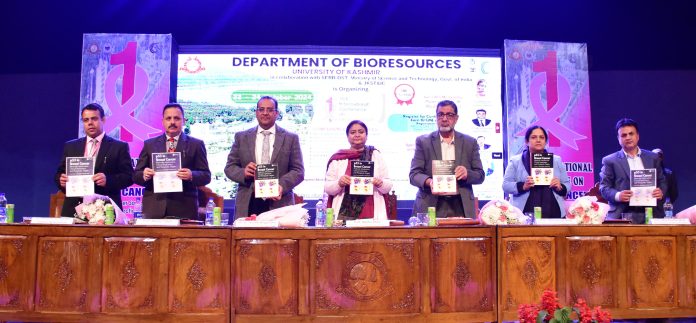‘Leveraging technology for mass awareness in rural areas crucial’
SRINAGAR: To improve female health outcomes in the region and encourage interdisciplinary collaboration in cancer care, the University of Kashmir (KU) Tuesday, inaugurated the ‘1st J&K International Conference on Breast Cancer’ here.
The event, that concludes Thursday (today), features free screening and early detection camp, along with technical lectures, panel discussions and documentary screenings.
The conference is being organised by the varsity’s Department of Bioresources in collaboration with the Science and Engineering Research Board (SERB)-Department of Science and Technology (DST), Government of India and the Jammu and Kashmir Science, Technology and Innovation Council (JKST&IC).
On the occasion, KU Vice Chancellor, Prof Nilofer Khan, highlighted the varsity’s ongoing contributions to public health research and stressed the need for introducing public health courses in the curriculum.
“We aim to pool resources for initiatives that focus on women’s health and create a roadmap for our departments to handle different issues related to healthcare,” she said while emphasising “early detection and small gestures can save lives” and that there is need to collectively fight this health issue.
Commissioner/Secretary, DST, J&K, Saurabh Bhagat, highlighted the pressing need for early intervention to combat breast cancer.
“KU is an effective platform for raising awareness. The insights gained from this conference will contribute to policy modifications,” he said while sharing statistics on cancer incidence and recovery rates in rural and urban areas.
Vice Chancellor, Indian Institute of Public Health, Hyderabad, Prof Anil Kaul, highlighted the need to shift from tertiary care to preventive measures such as early detection.
“We need to prevent patients from becoming patients in the first place. Leveraging technology (social media) for awareness in rural areas can make a significant difference,” he added.
Dean Research, KU, Prof M Sultan Bhat, highlighted the varsity’s role in fulfilling its social obligations through extension activities.
“The disease affects a substantial segment of the population, with considerable socio-economic implications. The incidence is shifting to younger age groups and we need to translate the effectiveness of medications to the grassroots level,” he said.
KU Registrar, Prof Naseer Iqbal, emphasised the societal impact of breast cancer and the need for awareness at the grassroots level.
“Breast cancer is a daunting issue, but there are effective treatments. We need to educate not just the public but also healthcare practitioners on safe medical practices,” he said.
Principal, Government Medical College (GMC), Srinagar, Prof Iffat Hassan Shah, underscored the importance of knowledge sharing and the role of GMC in breast cancer research and treatment.
“We need to normalise communication about this disease. Not every lump is cancerous, but we must not shy away from discussing it,” she said.
Organising Secretary and Head Department of Bioresources, KU, Dr Manzoor Ahmad Mir, provided insights into the genesis of the conference.
He said, “The initiative is designed specifically for women, focusing on breast cancer awareness, early detection and breaking the stigma surrounding the disease.”
Director, SKIMS, Srinagar, Prof M Ashraf Ganie, also attended the inaugural session.
The inaugural ceremony also featured the release of the conference souvenir and a book titled, ‘p53 in Breast Cancer – Molecular Mechanism, Clinical Implications, and Therapeutic Targets’, edited by Dr Manzoor Ahmad Mir.


